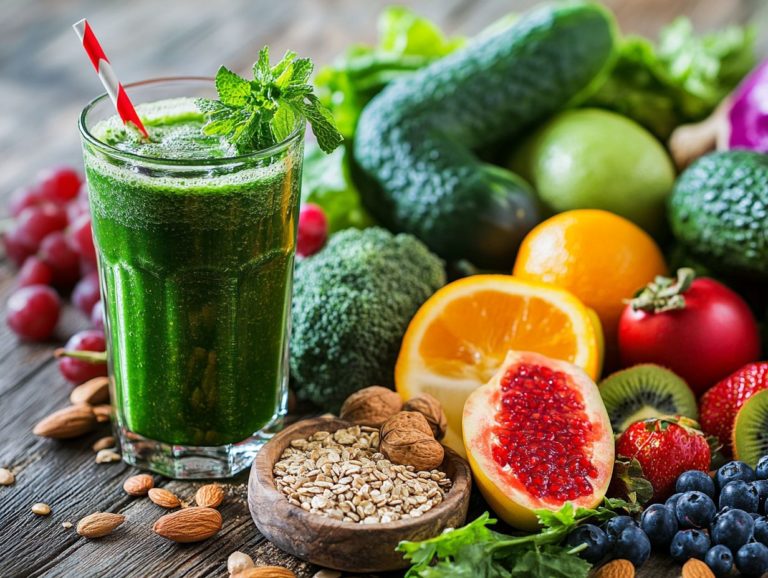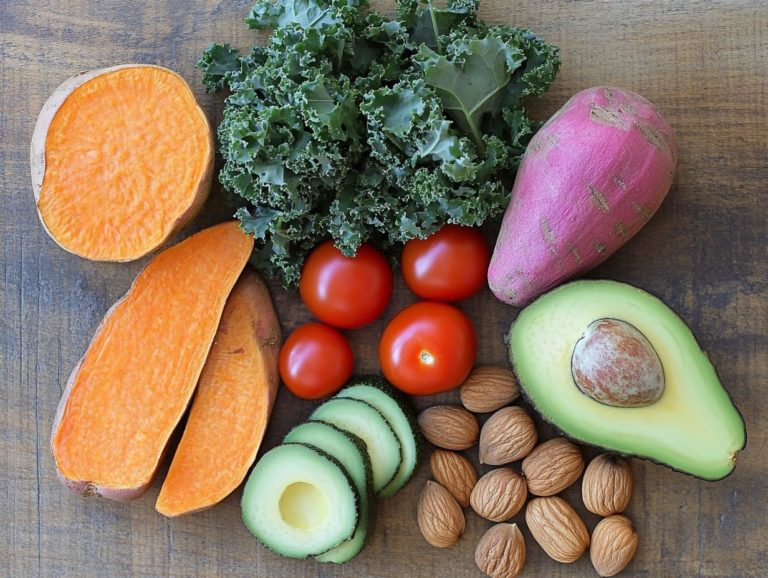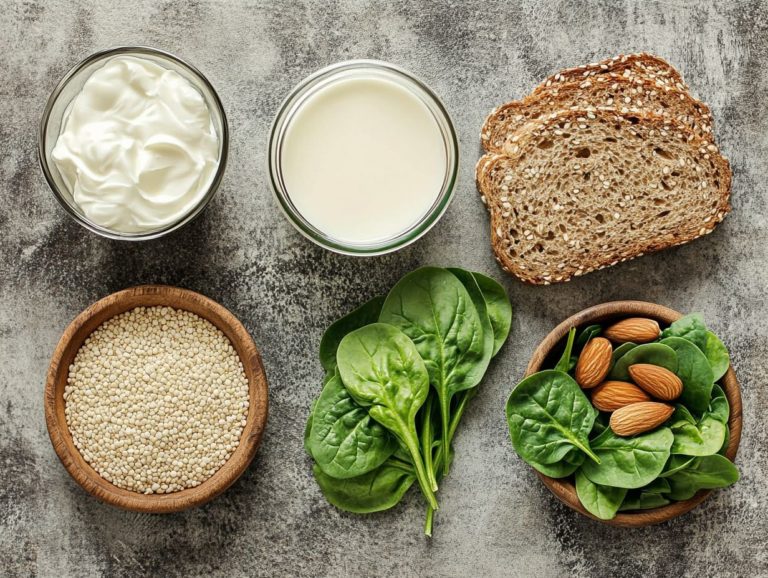The Benefits of Cooking with Fresh Herbs
Fresh herbs do more than just elevate the flavor of your dishes! They also introduce a wealth of health benefits to your table.
These vibrant plants are packed with essential nutrients and healing properties. They transform everyday meals into nourishing experiences. Dive into the nutritional value of fresh herbs, uncover tips for incorporating them into your cooking, and explore popular varieties along with their culinary uses.
Imagine the satisfaction of growing your own herbs! You can discover how they enhance your culinary journey.
Unlock the full potential of fresh herbs in your kitchen and elevate your cooking to new heights!
Contents
- Key Takeaways:
- What are Fresh Herbs?
- Health Benefits of Cooking with Fresh Herbs
- How to Incorporate Fresh Herbs into Your Cooking
- Popular Fresh Herbs and Their Uses
- Growing Your Own Fresh Herbs
- Summary
- Frequently Asked Questions
- What are the benefits of using fresh herbs in cooking?
- How do fresh herbs contribute to a healthier diet?
- What are some common fresh herbs used in cooking?
- Can fresh herbs be used in different types of cuisine?
- What is the best way to store fresh herbs?
- How can I incorporate fresh herbs into my cooking if I don’t have a garden?
Key Takeaways:
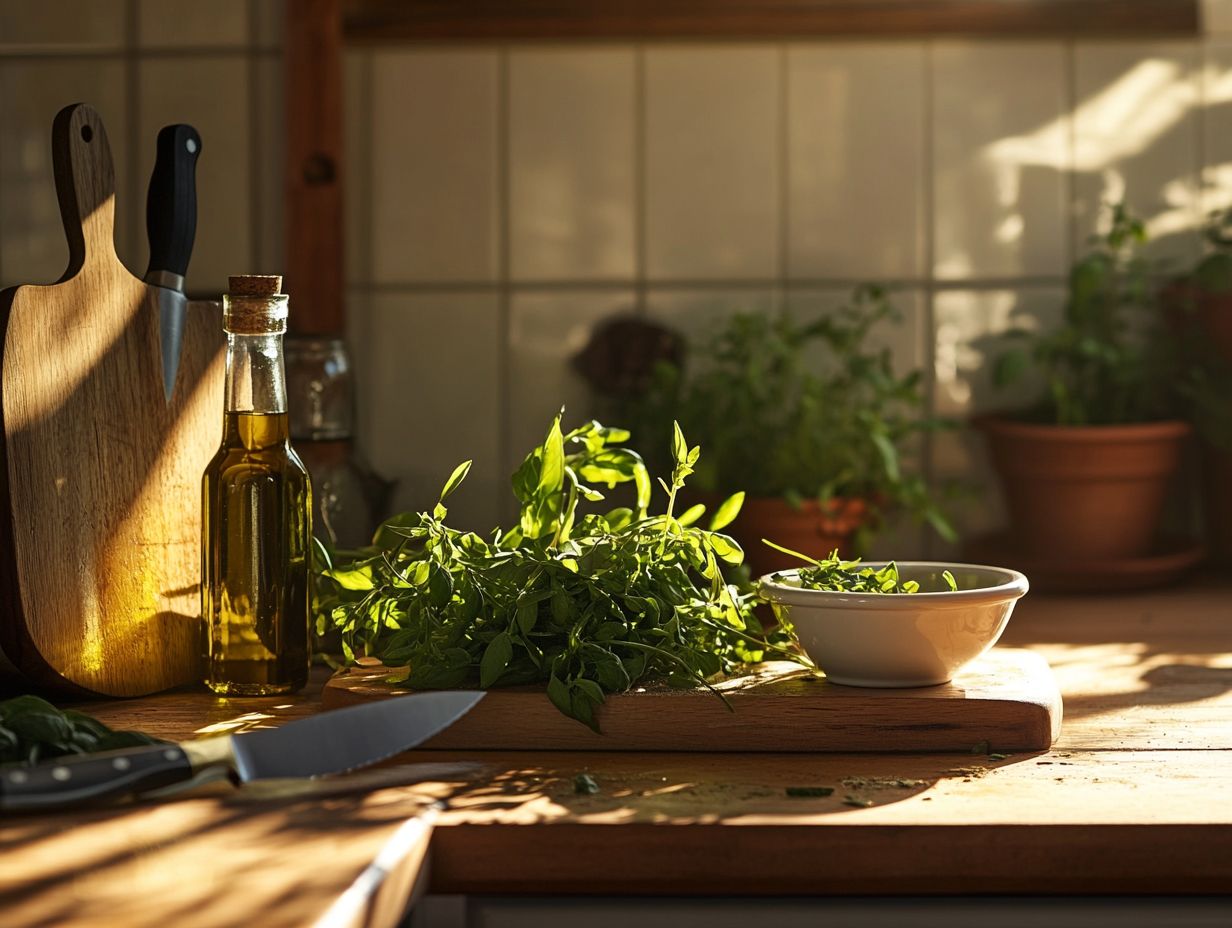
Fresh herbs are flavorful! They are also packed with nutrients and healing properties, making them a beneficial addition to any dish.
Incorporating fresh herbs into your cooking is easy. They can elevate the taste and health benefits of your meals.
Growing your own fresh herbs allows for convenience and cost-effectiveness. You can have a constant supply of high-quality herbs at your fingertips.
What are Fresh Herbs?
Fresh herbs are aromatic plants used in cooking. They elevate your dishes from ordinary to extraordinary, thanks to their unique flavors and health benefits.
These culinary treasures provide a rich source of vitamins, minerals, and other health-boosting compounds. They enhance flavors while contributing to a balanced daily diet.
Familiar herbs like basil, parsley, and cilantro are essential for Mediterranean dishes and traditional remedies. Others, such as tarragon and thyme, bring depth to various culinary and medicinal applications.
This guide will take you on a journey through the diverse world of fresh herbs and their delightful uses in your kitchen.
Health Benefits of Cooking with Fresh Herbs
Cooking with fresh herbs elevates the flavor of your dishes! They also offer a wealth of health benefits.
These aromatic companions are packed with plant compounds. They boast antioxidant and anti-inflammatory properties, promoting overall well-being and supporting digestive health.
By incorporating herbs like chopped parsley, basil, and mint into your culinary creations, you enhance taste and gain significant nutritional advantages. These herbs provide a rich source of vitamin K and other beneficial compounds that contribute to your vitality.
Nutritional Value and Healing Properties
Fresh herbs are not just a burst of flavor! They re also brimming with impressive nutritional value, offering a host of healing properties that can elevate your health.
Consider basil and parsley. They are rich in essential vitamins and minerals, including vitamin K, which is key for bone health. Some herbs even boast anti-cancer properties and other compounds that can enhance your overall well-being.
Cilantro is celebrated for its vibrant flavor. It is also praised for its ability to aid digestion and detoxify the body, thanks to its high antioxidant content. Rosemary has been shown to boost memory and concentration perfect for when you need a mental lift.
Incorporating these herbs into your daily meals is a simple yet effective way to harness their numerous benefits. By regularly using fresh herbs in your cooking, you elevate the taste of your dishes and promote improved health outcomes, making them an essential part of a balanced diet.
How to Incorporate Fresh Herbs into Your Cooking
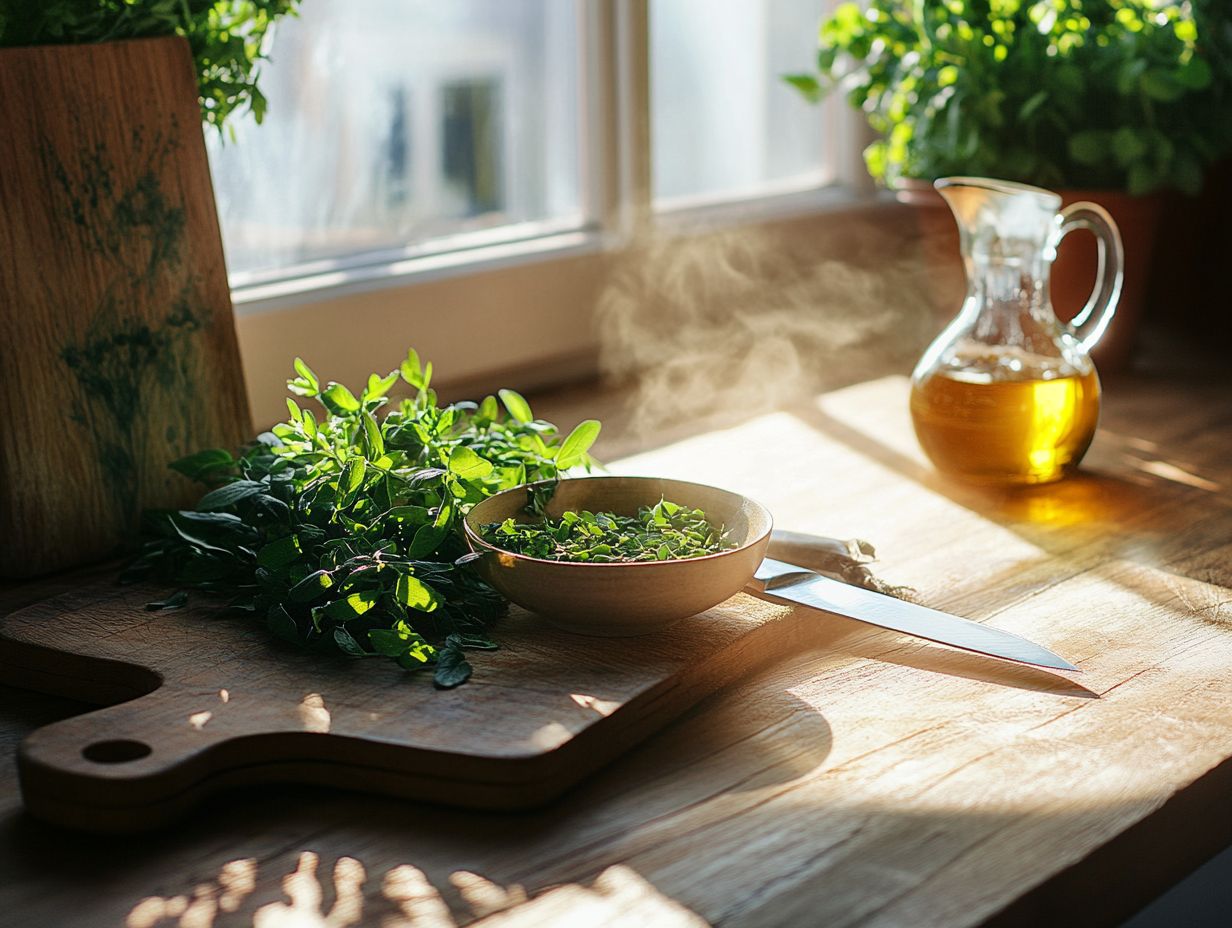
Incorporating fresh herbs into your cooking can truly elevate your dishes! They enhance flavors and create an exquisite culinary experience.
Whether you re crafting a classic tarragon chicken salad or simply adding a sprinkle of chopped parsley, mastering the art of using fresh herbs effectively unlocks their full potential.
Fresh herbs are incredibly versatile. They can season, garnish, or even serve as a base for herbal tea, making them essential companions on your culinary journey.
Start exploring fresh herbs today and transform your dishes!
Tips for Using and Storing Fresh Herbs
To truly maximize the flavors and longevity of fresh herbs in your kitchen, it’s crucial to grasp the best practices for their use and storage. Fresh herbs, like basil and rosemary, can wilt quickly if not treated with care.
Try placing herbs in water or wrapping them in damp paper towels. These methods help preserve freshness.
For instance, placing basil stems in a glass of water, much like arranging a bouquet, keeps them vibrant longer.
Think about mixing herbs like thyme or dill into olive oil to create a rich base for dressings or marinades. Pairing these fresh herbs with ingredients like garlic or citrus can elevate your culinary creations!
As you plan your meals, consider storing fresh herbs in airtight containers or freezing them in ice cube trays. This way, you can maintain their potent flavors for later use and enjoy that garden-fresh taste all year round.
Popular Fresh Herbs and Their Uses
Exploring popular fresh herbs and their myriad uses can elevate your culinary repertoire! Staples like basil, parsley, and cilantro are essential in many kitchens, serving versatile roles from garnishing to enhancing the flavors of Asian cuisine.
Unique herbs like tarragon and thyme add distinct flavors that enrich Mediterranean and traditional French dishes, illustrating the remarkable diversity of culinary herbs available.
Overview of Commonly Used Herbs
An overview of commonly used herbs unveils a rich tapestry of flavors and culinary applications essential for any home cook. Herbs like basil, parsley, and cilantro serve foundational roles in various cooking traditions, offering not just flavor but also health benefits.
By exploring the characteristics and uses of herbs like tarragon, thyme, and rosemary, you can deepen your appreciation of these culinary treasures.
Each herb brings its unique personality to your kitchen. For example, basil with its sweet, peppery notes is a staple in Italian dishes. Parsley contributes a fresh, slightly peppery flavor that brightens numerous recipes, while cilantro adds an aromatic, citrusy zest, making it irreplaceable in Mexican and Asian cuisines.
Many herbs also boast impressive health benefits: basil is celebrated for its anti-inflammatory properties, parsley is rich in vitamins, and cilantro may assist in detoxifying the body.
To incorporate these herbs into your cooking, envision adding fresh basil to pasta sauces, sprinkling parsley on roasted vegetables, or mixing cilantro into salsas and salads for an invigorating burst of freshness.
Growing Your Own Fresh Herbs
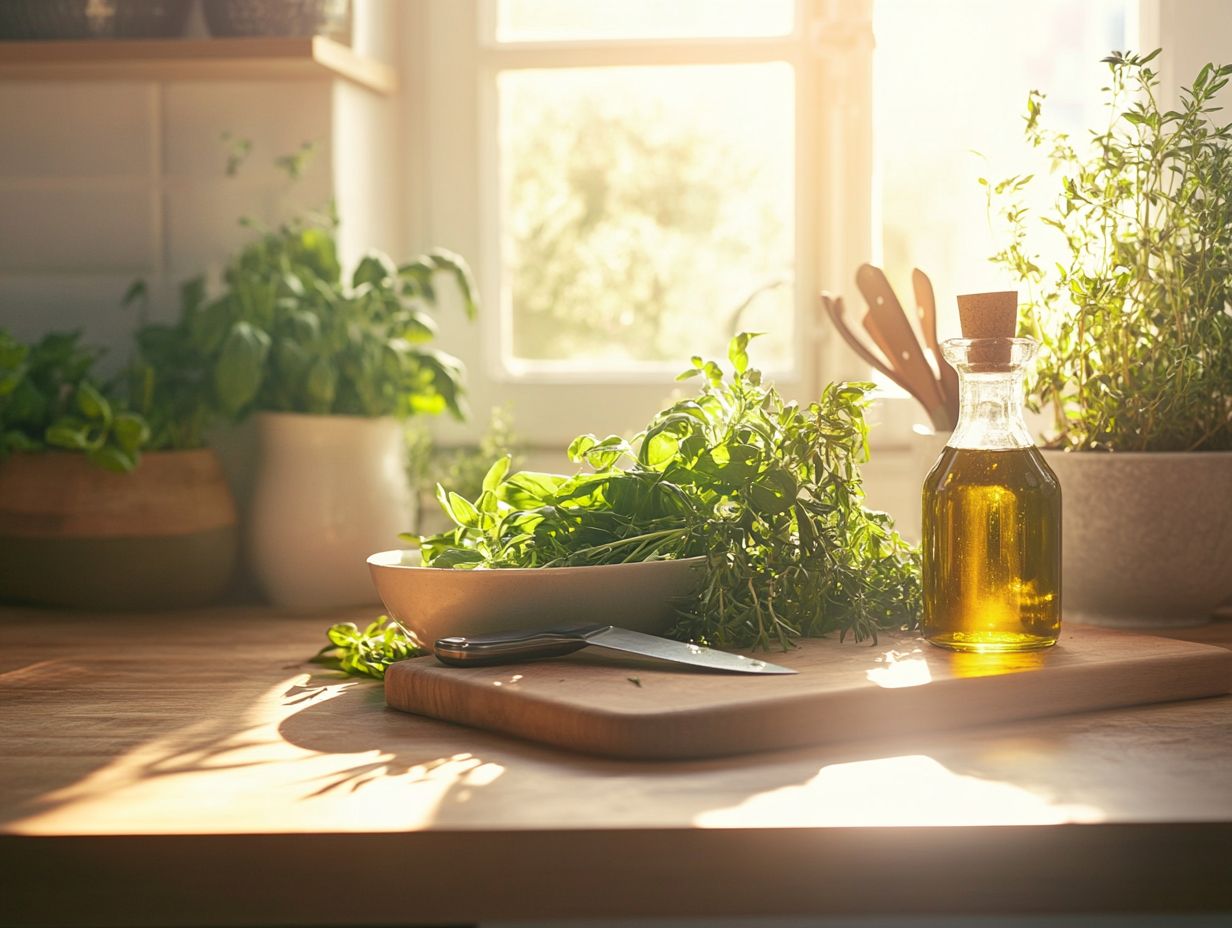
Growing your own fresh herbs is rewarding! It elevates your cooking and offers amazing health benefits.
You can easily cultivate herbs like basil, thyme, and rosemary in even the smallest of spaces, transforming your windowsill into a vibrant garden.
Nurturing these fresh herbs brings unique satisfaction, allowing you to harvest your culinary treasures and ensure they’re at their freshest for your dishes.
Why wait? Start your herb garden today and enjoy fresh flavors in your meals!
Summary
In conclusion, fresh herbs can transform your cooking experience, offering flavor, health benefits, and joy in cultivation. From using and storing techniques to exploring popular varieties, integrating fresh herbs into your meals can elevate your culinary journey!
Benefits of Growing and Caring for Fresh Herbs
The benefits of growing and caring for fresh herbs reach far beyond simply having flavorful ingredients at your fingertips. They offer remarkable health advantages and a profound sense of satisfaction.
By cultivating your own herbs, you unlock the freshest flavors that can elevate your cooking experience. You also infuse vital nutrients and health-boosting compounds into your meals.
Tending to these plants can be soothing. It promotes a sense of well-being that nourishes both body and mind.
Having your own herb garden can lead to significant economic savings. The costs of store-bought herbs can add up quickly.
With just a modest investment in seeds or young plants, you can enjoy a bountiful supply of delicious meals throughout the year.
Nurturing your garden fosters mindfulness and alleviates stress. This transforms simple gardening into a delightful hobby.
Imagine the fragrant aromas and vibrant colors of fresh herbs dancing in your kitchen! They not only beautify your living space but also encourage healthier eating habits, making it easier to incorporate more delicious and nutritious options into your everyday meals.
Summary of Benefits and Tips for Using Fresh Herbs in Cooking
Fresh herbs present a wealth of benefits that can elevate your culinary experience. They enhance flavors and bolster your health.
Their rich array of vitamins and health-boosting compounds can transform ordinary dishes into extraordinary creations. This makes the culinary use of fresh herbs truly invaluable.
Incorporating effective tips for using and preserving these herbs allows you to maximize their potential in your daily diet. For instance, adding basil or cilantro to your salads infuses vibrant flavor and delivers essential antioxidants substances that help keep your body healthy.
When incorporating herbs into your cooking, trim the stems and toss them in toward the end of the cooking process. This helps preserve their flavor and nutrient content.
For storage, keep fresh herbs in a glass of water or wrap them in a damp paper towel. This extends their freshness, ensuring they’re readily available for your everyday meals.
Try these simple cooking tips to unlock the full potential of fresh herbs! You can elevate simple recipes while enjoying the myriad health benefits they bring to your table.
Frequently Asked Questions
What are the benefits of using fresh herbs in cooking?
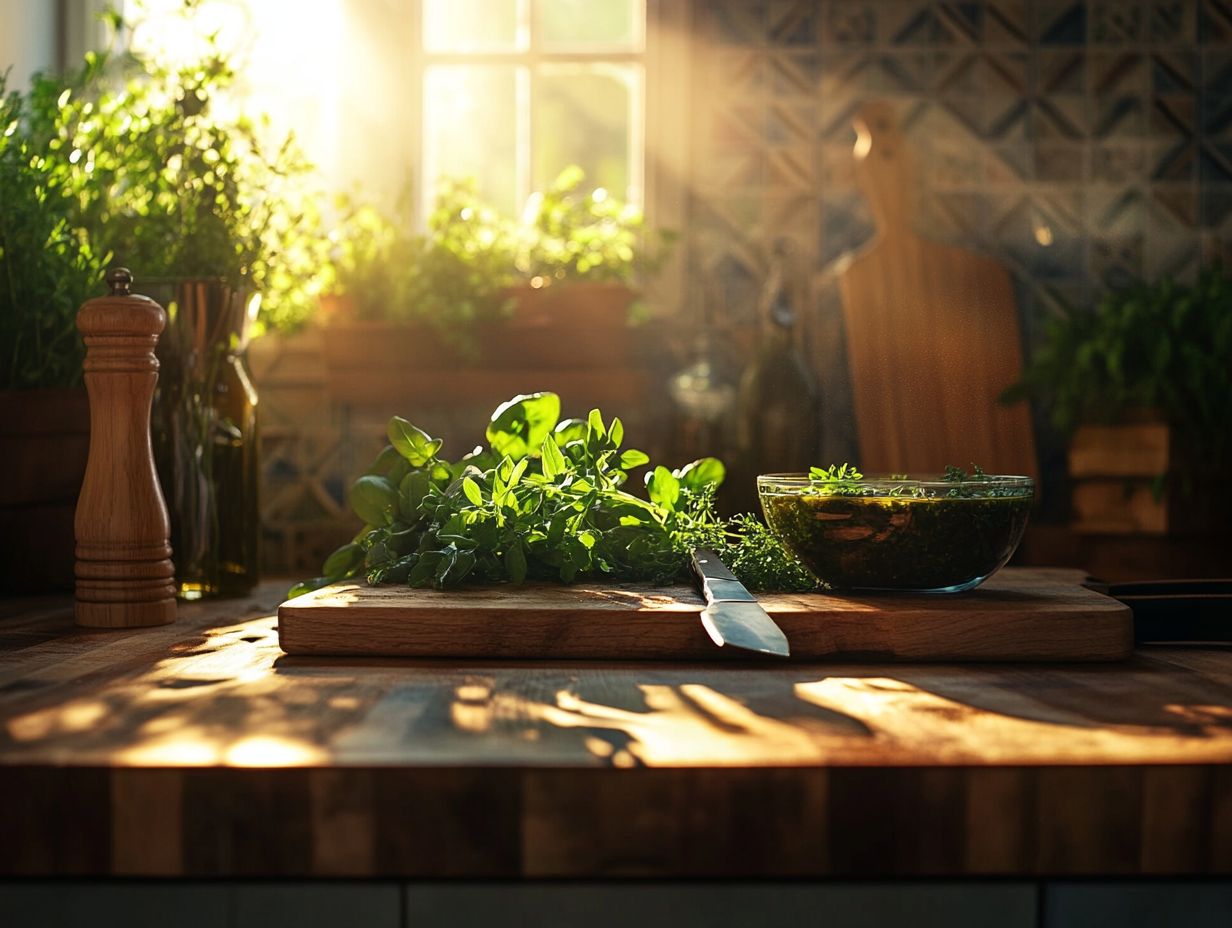
Fresh herbs add a burst of flavor and aroma to dishes compared to dried herbs, which can lose their potency over time.
How do fresh herbs contribute to a healthier diet?
Fresh herbs are packed with essential vitamins and minerals that boost the nutritional value of a dish. They also contain lower sodium levels compared to pre-packaged seasoning mixes.
What are some common fresh herbs used in cooking?
Popular herbs include basil, thyme, rosemary, parsley, cilantro, and dill. These herbs add a variety of flavors to dishes and can be easily grown at home.
Can fresh herbs be used in different types of cuisine?
Yes, fresh herbs enhance flavors in various cuisines, including Italian, French, Asian, and Middle Eastern. They can elevate dishes like pasta, stir-fries, soups, and salads.
What is the best way to store fresh herbs?
Store fresh herbs in an airtight container or wrap them in a damp paper towel and place them in the refrigerator. Alternatively, chop them and freeze in ice cube trays for later use.
How can I incorporate fresh herbs into my cooking if I don’t have a garden?
You can purchase fresh herbs from grocery stores or farmers’ markets. Consider growing them in pots on a windowsill or balcony. You might also join a community garden for easy access to fresh herbs.


